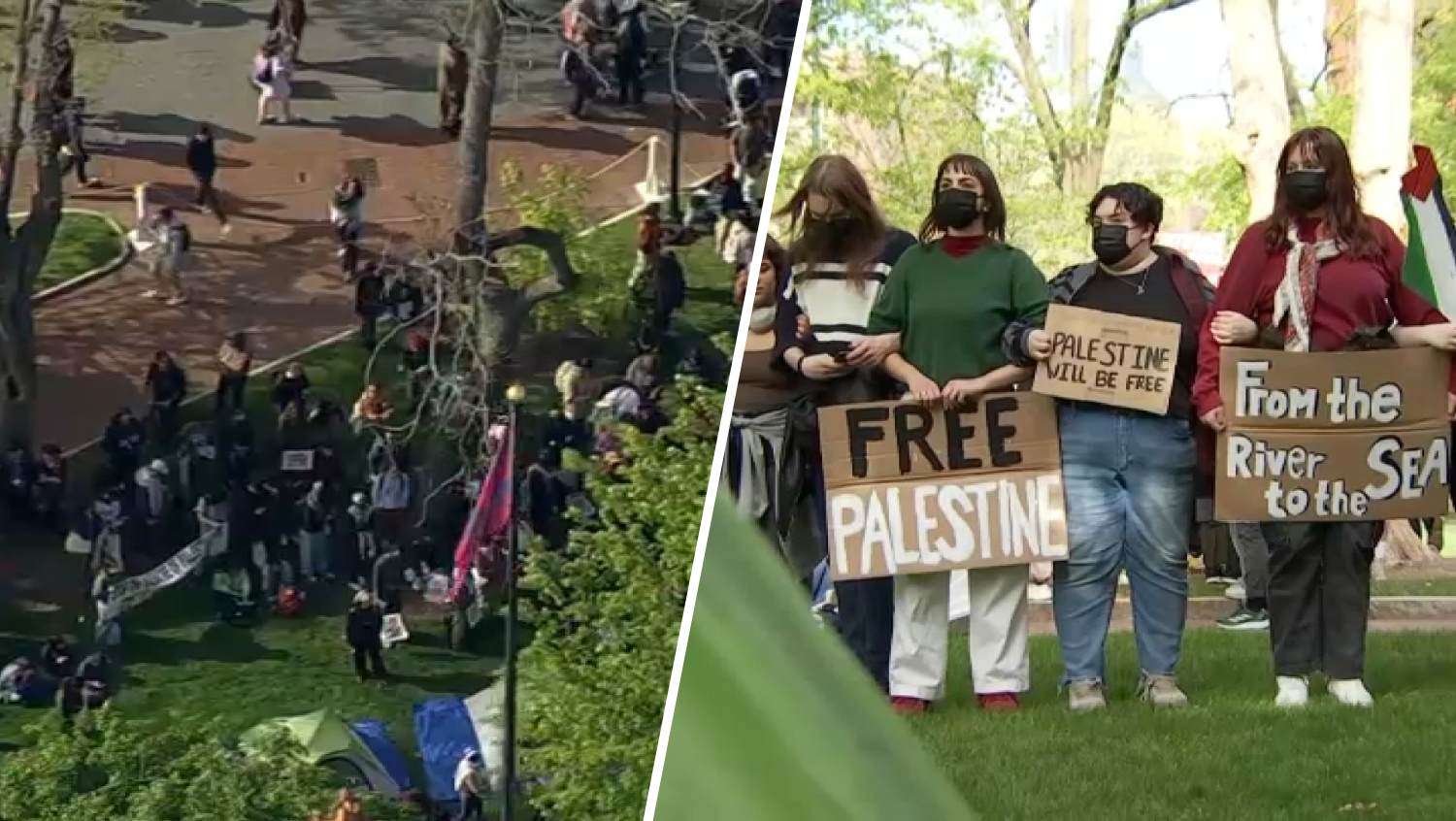Two of Penn State's most powerful officials will fight perjury charges and allegations they did not respond properly nine years ago after getting a report a young boy had been sodomized in the football team's showers, and will hear more of the alleged evidence against them Friday in a preliminary hearing to determine if their cases should go to trial.
Gary Schultz and Tim Curley were charged with perjury and failure to report child abuse in early November, on the same day Jerry Sandusky was accused of sexual abuse of eight children.
Schultz was a vice president at the university and had overseen the campus police. Curley was the university's long-serving athletic director. Since they were arrested six weeks ago, Schultz has retired and Curley has been on administrative leave.
The hearing in Dauphin County court in Harrisburg requires the attorney general's office to prove there is a minimum of evidence to support the charges, a relatively low bar and a proceeding that defendants have the right to waive. Sandusky, the school's retired assistant football coach, is charged with 52 criminal counts and a second indictment brought to 10 the number of alleged victims.
Sandusky on Tuesday waived his preliminary hearing at the last minute. His lawyer said he was concerned the proceeding would be too one-sided and that prosecutors had agreed not to seek a bail increase.
The attorneys for Curley and Schultz have not indicated they intend to waive, and even issued a statement earlier this week saying the defendants were looking forward to the preliminary hearing and "to start the process of clearing their good names and demonstrating that they testified truthfully to the grand jury.'' They declined comment Thursday, but said they would speak with reporters after the hearing.
A key witness Friday could be Mike McQueary, an assistant football coach who the grand jury said told them he saw Sandusky attacking a boy in the shower.
Local
Breaking news and the stories that matter to your neighborhood.
Curley and Schultz gave different accounts, and are charged with not properly alerting law enforcement when McQueary contacted them.
To support the perjury charges, prosecutors must show probable cause the two men lied and that the lies were intentional and material to the case.
"Even though you've had some fairly celebrated folks convicted of perjury, it's a very tough charge to prove,'' said Temple University law professor Edward Ohlbaum. ``You have to have a clear question, an unequivocal answer, and (prove) the defendant knew what he was saying was false.''
McQueary's testimony is central to the case, and Sandusky's lawyer and others think he will have to testify Friday. His appearance would mark the first time he has testified in public about what he saw and heard inside the Lasch Football Building.
McQueary told the grand jury he saw Sandusky raping the boy one Friday night before spring break. He said he called his father, then left distraught. He and his father met with coach Joe Paterno the next day.
Paterno, in turn, told his boss, Curley.
Paterno, according to the grand jury report, told Curley that his graduate assistant had seen Sandusky "fondling or doing something of a sexual nature.''
Schultz, who oversaw campus security, and Curley met with McQueary 10 days later. McQueary told them that he thought Sandusky had sodomized a young boy, according to his grand jury testimony, which the panel found "extremely credible.''
Curley, though, denied that McQueary reported a rape or anything ``of a sexual nature whatsoever,'' the report said. The athletic director described the conduct as ``horsing around,'' the panel said.
Schultz was unsure of what he had been told, but denied the reported conduct included sodomy. He told the grand jury that he was left with "the impression that Sandusky might have inappropriately grabbed the young boy's genitals while wrestling.''
The accounts continued to morph, according to the grand jury's outline, when the two university officials spoke to school President Graham Spanier. Spanier testified that he was told Sandusky and a boy "were horsing around in the shower.''
Curley, 57, and Schultz, 62, face up to seven years in prison if convicted of perjury. The other charge is a summary offense, less serious than a misdemeanor. The hearing raises the prospect that Paterno, the 84-year-old campus icon now being treated for lung cancer and a re-fractured pelvis, may be called to the stand. The attorney general's office declined to say who is on its witness list, and it's unclear whether prosecutors could have his grand jury testimony read into the record.
In Pennsylvania, prosecutors must corroborate a lone witness' testimony with either physical evidence or a second person's testimony to meet the probable cause threshold, Ohlbaum said.
Bruce Antkowiak, a former federal prosecutor and defense attorney who now teaches law at St. Vincent College near Latrobe, said he'd bet on McQueary taking the stand.
"If I were the defense, I would be expecting to see McQueary,'' Antkowiak said. ``While some hearsay is permissible, you can't just get up and re-read his grand jury testimony or some other statement into the record.''
Charles Porter, a veteran Pittsburgh defense attorney, said the law is that an entire case can't consist of just hearsay evidence at a preliminary hearing.
"To the extent the government has anything else they can offer (as evidence) they could try to just read in his statement into the record,'' Porter said. ``But, the reality in a case like this is, I think he has to take the stand. He appears to be their entire case, as much as I can tell.''
No one answered the door at McQueary's home Thursday. His father, John, declined comment to The Associated Press.
McQueary told the grand jury that he happened upon ``rhythmic, slapping sounds'' in the locker room showers and added that both Sandusky and the boy saw him there, according to a grand jury presentment. Authorities did not know the boy's identity when the report was issued.
McQueary has become a lightning rod in the case, taking heat for not going to the boy's aid or immediately calling police. In a recent email to friends, he went on the defensive, saying he made sure the abuse stopped and went to authorities.
Defense lawyers would no doubt challenge McQueary about his more recent statements. Local and campus police have said they received no such complaint.
Meanwhile, The Patriot-News of Harrisburg has reported that McQueary's story changed when speaking in 2002 to Dr. Jonathan Dranov, a family friend. The newspaper report cited a source said to be familiar with Dranov's testimony.
"If this information is true, and we believe it is, it would be powerful, exculpatory evidence and the charges against our clients should be dismissed,'' Caroline Roberto, a lawyer for Curley, and Tom Farrell, the attorney representing Schultz, said in their statement.
The Associated Press was unable to reach Dranov this week at his home and office.



